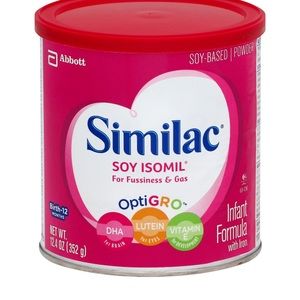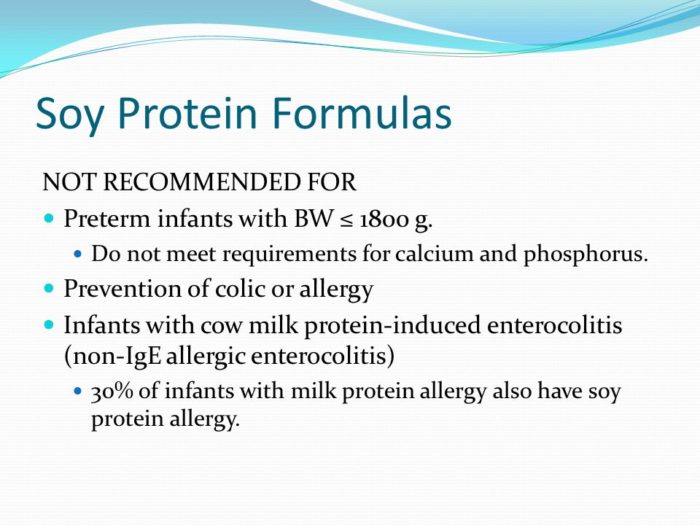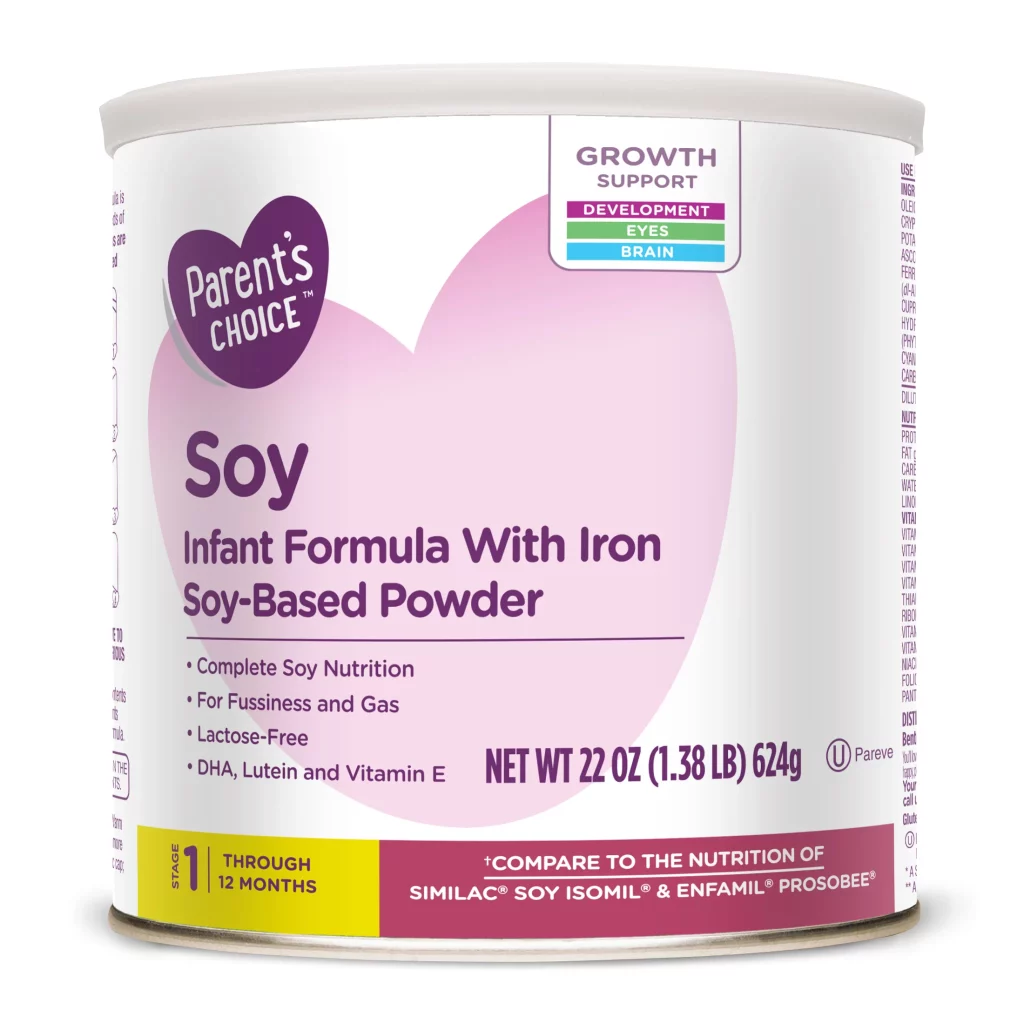The option of soy-based formula has become increasingly popular among parents who seek an alternative to cow’s milk-based formula or have a concern about their baby’s milk allergy. The isomil variant, which is a widely-used soy formula, boasts protein that rivals the quality of cow’s milk and provides all essential nutrients for optimal growth and development.

However, here’s where things get complicated: some babies may not react favorably to soy formula and could encounter digestive complications such as bloating or gas. Let’s also throw in another curveball – there are lingering concerns regarding phytoestrogens found in soy and its possible impact on infant development. Despite this concern, extensive research has yet to uncover any significant negative effects.
If you’re considering using soy-based formula for your little one, it would be wise to discuss with your pediatrician first. They can determine if it’s safe and effective based on individual needs while taking into account medical history. It might even be recommended that you try other hypoallergenic formulas before resorting to the use of soy products.
All things considered, while soy-based options may be suitable for certain infants, it’s vital that one examines all available choices thoroughly before making a decision. Collaborating closely with healthcare providers when choosing the best baby-formula option will always yield better outcomes in the long run!
The Pros and Cons of Soy Formula for Infants: Is It the Best Choice for Your Baby?
The enigmatic world of infant feeding choices offers up soy-based formula as a perplexing alternative to traditional cow milk-based options. Parents may opt for this plant-based concoction if their little one is plagued by a pesky milk allergy or lactose intolerance, or perhaps they adhere to the tenets of vegetarianism or veganism. But lo and behold, just like any other baby formula on the market, there are both advantages and drawbacks to employing soy formula for your precious bundle.

One positive attribute of soy formula is its suitability for infants with an aversion to all things bovine. Soy protein eschews lactose altogether, thereby obviating potential digestive troubles in certain babies. Furthermore, research has demonstrated that soy-derived formulas perform comparably well as cow’s milk alternatives in supporting healthy growth patterns and developmental milestones.
But wait! There’s more…Some experts caution that excessive ingestion of soy could lead to hormonal imbalances among infants due to its phytoestrogenic properties. And although rare, some wee ones might also develop an allergic reaction towards this leguminous protein much akin to cow’s milk-induced allergies.
In conclusion then – selecting the optimal baby formula necessitates consideration of various factors such as your youngster’s medical history and dietary requirements. Always ensure you consult with your pediatrician before settling on whether or not you should introduce this bewitching brew into your child’s diet regimen.
Milk Allergy in Infants: Can Soy-Based Formula Be a Safe and Effective Alternative?
The perplexing issue of finding a safe and effective alternative to traditional milk-based formula arises when an infant is diagnosed with a milk allergy. In recent years, soy-based formula has burst onto the scene as a popular option for concerned parents. Soy protein, being plant-based, seems like a suitable alternative for infants who cannot tolerate the proteins found in cow’s milk.
According to the American Academy of Pediatrics (AAP), soy infant formula can provide complete nutrition for healthy full-term infants who are not breastfed or require supplemental feedings. But wait! Hold your horses! It’s important to note that some infants with a milk allergy may also have an allergic reaction to soy protein. This leaves us all feeling confused and uncertain about what course of action we should take. Therefore, it is crucial that pediatricians be consulted before making any changes to your baby’s diet.
If you do decide to switch from milk-based formula and your infant does not have an allergy to soy protein – hold on tight this gets more complicated – switching could potentially alleviate symptoms such as fussiness and digestive issues associated with a milk allergy… Phew!
It is vital that you choose high-quality soy infant formula that meets all of your baby’s nutritional needs while providing adequate levels of vitamins and minerals; otherwise, it will just add another layer of confusion.
Ultimately, the decision on whether or not to switch from milk-based formula should be made after consulting with your pediatrician – they know best after all! They will take into account your baby’s individual health needs based on their medical history & current condition; however tricky they might be handling this burden effectively by working closely with them will ensure optimal nutrition is provided for little one whilst managing their allergies appropriately – Who knew parenting was going to be such hard work?!
Best Soy Formula Brands for Your Baby: A Comprehensive Review of Soy-Based Formula Products
When it comes down to selecting the finest soy formula for your dear little one, brace yourself as there are a plethora of alternatives available on the market. For babies who suffer from lactose intolerance or cow milk allergy, soy-based formulas emerge as an impeccable alternative. The primary protein source in these formulas is soy protein isolate and they’re often fortified with essential vitamins and minerals.
Let’s not forget that not all babies can tolerate soy formula; therefore, parents must exercise caution before making any switch and seek guidance from their pediatrician. However, if your baby can consume soy formula without any unpleasant reactions then it may be deemed safe and effective for them. Some studies suggest that plant-based formulas like soy may offer some benefits over conventional cow milk-based ones.
But hold on tight because here’s something you ought to keep in mind while using soy formula – not all brands are created equal! Different companies hydrolyze their products differently which significantly affects how well they’re digested by infants. Cheaper brands tend to contain more sugar but lesser nutrients compared to high-quality ones such as Gerber Soy Formula, which has received rave reviews worldwide!
Cow Milk-Based Formula: Which One Is Right for Your Baby?
Feeding your infant can be a perplexing task, especially when it comes to selecting the perfect formula. With an abundance of options available, cow’s milk-based formula stands out as a prominent choice. This variant is crafted from modified cow’s milk, which aims to mimic breastmilk as closely as possible. Although this option works well for many babies, some may face adversity due to their allergy towards cow’s milk protein.
If such infants consume cow’s milk-based formulas despite their allergies, they tend to exhibit symptoms like colic, diarrhea, eczema or skin rashes and vomiting – leaving parents exasperated and worried. In these circumstances, pediatricians usually recommend switching over to soy-based formulas instead. However, if your baby does not have any signs of intolerance towards dairy products and is doing well on whole cow’s milk or other forms of dairy in their diet then there is no need for you to opt for soy formulas over the former.
It’s crucial that parents understand that although soy might serve as an adequate substitute for infants with a cow’s milk allergy or intolerance; it should never be used solely without consulting with medical professionals beforehand. Cow’s Milk Formula still remains one of the most popular choices amongst parents since it bears close resemblance in composition with breastmilk whilst also being readily available worldwide – making life easier for frequent travellers or those living abroad where specialty stores are hard to come by!
Switching to Soy Formula: When and How to Make the Switch for Your Baby’s Health
When it comes to transitioning your little one onto soy formula, there are a plethora of perplexing elements that parents should ponder. Before making any decisions, it is highly recommended to have an in-depth discussion with your child’s pediatrician. This will provide unparalleled guidance on whether or not soy formula is fitting for your baby based on their unique requirements and medical history.
In the event that you do opt for soy-based sustenance, it is essential to select a reputable brand that provides all the necessary nutrients – trust us, burstiness won’t cut it when catering to your infant’s nutritional needs! It would be wise to seek out formulas containing both soy oil and soy isoflavones as these are vital components in delivering proper nutrition.
It must also be acknowledged that although some babies may require soy-based solutions due to milk protein intolerance or other health issues, most full-term infants can thrive on conventional cow milk-based formulas. In conclusion, pinpointing the ideal baby formula ultimately hinges upon each individual child’s distinctive needs and circumstances – prepare yourself for a whirlwind of choices ahead!
Allergic to Soy: What Are the Alternatives to Soy-Based Formula for Infants?
The quest for the perfect baby formula can be a perplexing challenge, particularly when it comes to infants with soy allergies. While breast milk reigns supreme as the optimal choice, parents of babies who require supplementation or cannot breastfeed need to explore other alternatives. For those allergic to soy and suffering from reactions after consuming soy-based formulas, cow milk-based formulas may offer a viable solution.
Choosing the correct formula is crucial in ensuring that your child receives adequate nutrition without experiencing discomfort or adverse effects from their diet. If your infant displays signs of fussiness and gas after ingesting soy-based formulas, it’s time to consider switching things up. Soy formula may work wonders for many healthy babies; however, some may have an allergic reaction.
When looking for an alternative to soothe your little one’s tummy troubles caused by soy intolerance, cow milk-based formulas are highly popular among both pediatricians and parents alike. These types of formulas contain modified cow’s milk protein that makes digestion easier on babies’ delicate digestive systems. However, note that these should not be given before six months of age due to having more protein than breastmilk or other formulations.
It’s important always to consult with healthcare professionals before making any changes in your infant’s diet as every child has unique needs requiring individualized attention during such transitions actively.
In conclusion: The process of finding the right baby formula requires careful consideration and informed decision-making skills – especially when dealing with allergies like this! With proper research and guidance from trusted sources like pediatricians or lactation consultants (if possible), you can confidently navigate through this confusing journey towards finding what works best for you and your baby!
The Role of Pediatricians in Choosing the Best Soy Formula for Your Baby: Expert Advice and Recommendations.
Pediatricians hold a weighty responsibility in guiding parents towards the most optimal soy-based formula for their precious little ones. The intricate details of soy formulas, both pros and cons, are carefully dissected under the watchful eye of these experts. Additionally, they will recommend specific brands that cater to an infant’s nutritional requirements with utmost accuracy. Yet, one must tread with caution when considering such formulas as not all babies respond favorably to them due to potential digestive issues or allergies.
Powdered formulas offer a unique advantage by providing just enough mixture for each feeding session, thus reducing wastage and saving money over time. Also noteworthy is the fact that many soy formula brands offer bespoke options tailored to meet specific needs such as vegan baby formula or preterm infants’ dietary requirements. However, it is crucial always to seek advice from pediatricians before making any decisions regarding which brand or type of formula would best suit your child.
Moreover, while soy-based milk can be an excellent alternative for babies suffering from milk allergies or lactose intolerance; some may experience side effects like gas and constipation during transitioning from cow-milk based products. As every baby grows at different rates and develops uniquely – pediatricians act as vigilant guardians who monitor progress closely ensuring your child receives all necessary nutrients required by whichever type of infant-formula product you decide on without compromising quality nutritionally balanced diet plan essential for your little darling!

